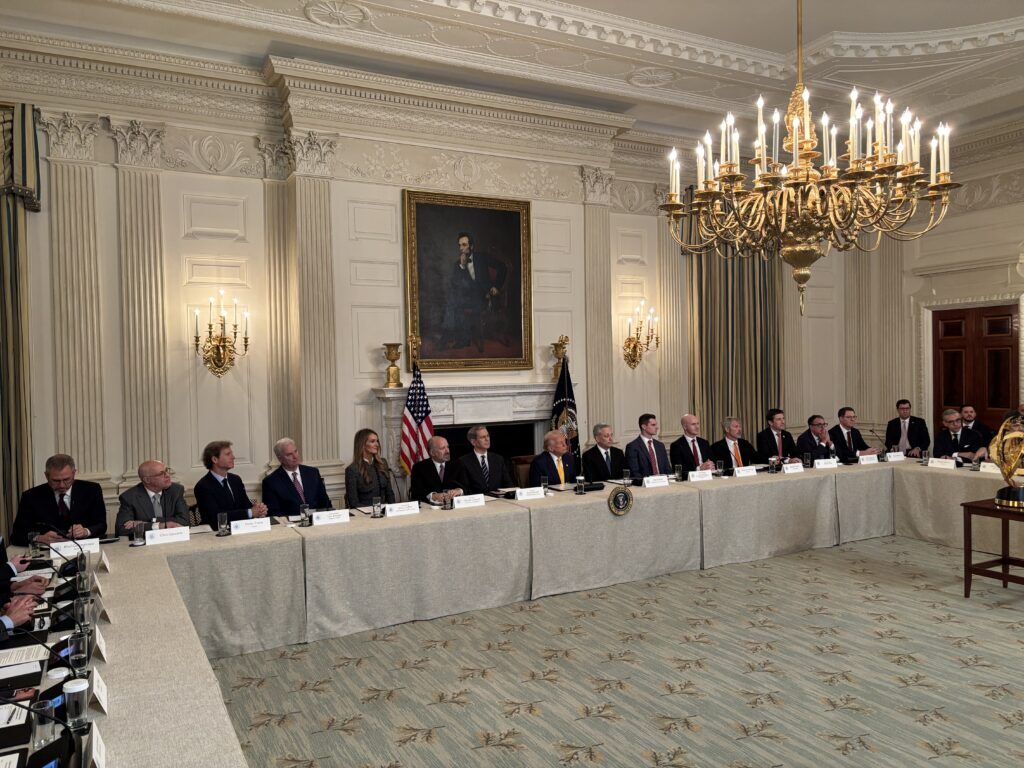Bitcoin Policy
White House Draws Line Between Bitcoin And Digital Assets At Its First Crypto Summit, In EO
Published
2 months agoon
By
admin
“From this day on, America will follow the rule that everyone in Bitcoin knows very well — never sell your Bitcoin.” -President Donald Trump, 3/7/25 at inaugural White House Crypto Summit
The President of the United States is now reciting popular Bitcoin maxims as they pertain to America’s bitcoin stack.
Wild.
It’s clear that he’s gotten the message that bitcoin is something altogether different than all other digital assets.
He’s proven this not only by what he said at today’s Crypto Summit, but also by signing an executive order (EO) last night that established a Strategic Bitcoin Reserve (SBR) independently of a Digital Asset stockpile.
The Strategic Bitcoin Reserve
Regarding the SBR, the President said today that the U.S. plans to hold onto the bitcoin it has in its possession, unlike previous administrations who have sold massive sums of it.
“Unfortunately, in recent years, the U.S. government has foolishly sold tens of thousands of bitcoin (200,000, by some estimates) that were worth billions and billions of dollars had they not sold them,” said President Trump.
That said, the President also shared that members of his administration will pursue avenues to accumulate bitcoin — at no expense to the American public.
“The Treasury and Commerce departments will explore new pathways to accumulate additional bitcoin holdings for the reserve, provided it’s done at no cost to the taxpayers,” he said.
“We don’t want any cost to the taxpayers,” he reiterated, highlighting the notion that the U.S. government plans to amass bitcoin in a “budget-neutral” (to borrow language from last night’s EO) manner.
Attendees
Treasury Secretary Scott Bessent and Commerce Secretary Howard Lutnick were present at the summit alongside approximately 30 prominent members of the Bitcoin and crypto industry, including Strategy Executive Chairman Michael Saylor, Coinbase CEO Brian Armstrong, Gemini co-founders Cameron and Tyler Winklevoss, and BTC Inc. CEO David Bailey.

Other members of the Trump administration, including head of Small Business Administration Kelly Loeffler and White House Crypto Czar David Sacks, were also in attendance.
Both Sacks and Loeffler praised the pace at which Trump is making progress with Bitcoin and crypto executive orders and legislation.
“Your administration is moving at tech [startup] speed,” said Sacks.
“It’s actually faster than any startup that I’ve been part of,” added the venture capitalist, well-known for investing in many tech startups over the course of his career.
Secretary Lutnick vouched for President Trump’s newfound Bitcoin and crypto knowledge, adding that the President has truly come to embrace the technology.
“Blockchain and Bitcoin technology are a key part of [the President’s] thinking,” said Lutnick.
“We’re using blockchain. We’re using Bitcoin. We’re going to use digital assets to [push] forward, and Donald Trump is leading the way,” he added.
Stablecoins As Money, Bitcoin As Store Of Value
Now, before you go and get too excited about Secretary Lutnick talking about “using” bitcoin, please know that with all the bullish bitcoin talk at the event, not a word of bitcoin being used as money was uttered. Instead, it was solely referred to as a savings technology.
As far as digital assets that the administration views as money, stablecoins stand alone.
And Secretary Bessent reinforced this message, most recently pushed at both the first U.S. Press Conference on Digital Assets and the first Subcommittee on Digital Assets hearing, at the summit.
“We are going to put a lot of thought into the stablecoin regime,” said Secretary Bessent. “And as President Trump has directed, we are going to keep the U.S. [dollar] the dominant reserve currency in the world, and we will use stablecoins to do that.”
(And before you go cursing Secretary Bessent under your breath as you read this, please note that he also dropped an absolutely banger of a pro-bitcoin one-liner at the event: “President Trump is creating assets for the American people while most past presidents have created debt.”)
What Wasn’t Discussed
What is more, on a summit preview call with senior White House officials this morning, one of the officials dispelled the rumor that the administration would remove the capital gains tax from crypto sales (which is also applicable when you spend bitcoin or crypto), clearly stating that the administration has no plans to do this and that the topic wouldn’t even be broached at the summit. (It wasn’t.)
Something else that wasn’t discussed at the summit was whether or not the U.S. Marshalls have provided the Trump administration with a proper audit of the bitcoin and other digital assets in their custody (last it was reported, they apparently have little idea of what they’re holding). Also unmentioned was how the government plans to secure the private keys to the bitcoin it keeps in the SBR. (I planned to inquire about the latter, but the members of the press present at the event weren’t permitted to ask questions.)
But let’s not get lost in some of the currently minor details here.
It Was A Good Day
Instead, let’s take a queue from Brian Armstrong, and acknowledge that today was, by many standards, a good day.
“It was a pretty historic moment for the crypto industry,” Armstrong told Bitcoin Magazine after the summit had concluded.
“President Trump really breathed life back into this industry. A few years ago, it felt like we were under attack, and some folks tried to unlawfully kill the whole industry. What a sea change to be invited into the White House and to have the most pro-crypto president ever,” he added.
Armstrong also noted that, next, he wants to see legislation passed to help make concrete some of the positive Bitcoin and crypto initiatives set in motion under the Trump administration.
“Congress is making really good progress on this with stablecoin and market structure legislation, and hopefully codifying this Strategic Bitcoin Reserve eventually, as well.”
Source link
You may like


Bitcoin (BTC) Yield Platform Coming From Coinbase (COIN), Aspen Digital


The Emerging Market For State Services Via Citizen X


XRP Price Shoots For 20% Surge To $2.51 Amid Pullback To Breakout Zone


Stocks edge higher ahead of big earnings week


Here’s How Bitcoin Could Boost Demand for US Treasuries, According to Macro Guru Luke Gromen


Experts Predict US Recession in 2025 if Trump-China Trade War Tariffs Stay
Bitcoin
Rhode Island Bill Would Allow State Residents Spend $10,000 Monthly In Bitcoin Tax Free
Published
4 weeks agoon
April 1, 2025By
admin
Bill S. 0451, which was introduced to the Rhode Island Senate last month, permits the state’s residents and businesses to make up to 10 payments in bitcoin valued at less than $1,000 per month (or sell the equivalent amount) without being subject to state capital gains taxes.
The bill is an amendment to existing state income tax laws, and the exact language in the proposed legislation is as follows:
“Any sale of [b]itcoin by an individual or business in Rhode Island shall be exempt from state taxation if the total value of sales is less than one thousand dollars ($1,000) per diem. The limit of the state tax exempt [b]itcoin transaction shall not exceed ten (10) sales per a thirty (30) day cycle.”
And the bill defines a “sale of [b]itcoin” as “any transaction in which [b]itcoin is sold or exchanged for another form of value, such as fiat currency or other physical or digital assets.”
The bill also clarifies that this exemption only applies at the state level and that it doesn’t affect federal tax obligations.
Under the bill, individuals and businesses who engage with these types of tax-exempt bitcoin transactions are responsible for keeping records of these transactions, including the total value of sales per day, and should be prepared to provide these records to the Rhode Island’s department of revenue for audit or compliance purposes.
In a slide deck prepared by the Rhode Island Blockchain Council that was shared with Bitcoin Magazine, Chris Perrotta, Chairman of the Council, wrote that the passing of Bill S. 0451 would help to reduce friction for digital asset payments.
He stated that “current tax implications of spending BTC hamper its utility for Rhode Island citizens and stifle economic activity.”
Perrotta also noted that the passing of this bill would stimulate blockchain-based economic activity in the state, making Rhode Island one of the states at the forefront of this technology.
What is more, he also proposed that small businesses accept bitcoin for products and services as a means to stimulate economic growth.
Thus far, no other U.S. states have introduced comparable bills.
At the federal level, the only bill that has proposed something similar is the Lummis-Gillibrand “Responsible Financial Innovation Act”, which provides a de minimus tax exemption on bitcoin transactions valued up to $200.
Source link
Bitcoin Policy
Proposed Bipartisan Legislation Recognizes Bitcoin As A Technology That Supports Democracy
Published
1 month agoon
March 27, 2025By
admin
On Wednesday, the office of Rep. Gabe Amo issued a press release stating that Rep. Amo and Rep. Kim (R-CA) reintroduced a bipartisan resolution supporting the use of distributive ledger technologies (DLT), including blockchain, to “support democratic governance, human rights, freedom of information, transparency, and innovation around the world.”
The resolution (the full text of which was not linked to in the press release) urges federal agencies to explore and support DLT and expresses Congress’ commitment to advancing responsible innovation on this technological front.
Rep. Kim commented on the importance of this technology in the press release.
“U.S. leadership in emerging technologies like blockchain not only improves Americans’ lives but also helps us advance transparency in U.S. foreign assistance, human rights, and freedom across the globe,” said Rep. Kim.
“This legislation is vital, especially as we see the Chinese Communist Party exporting its surveillance technologies and authoritarianism abroad. I am proud to join Congressman Amo to lead this bipartisan resolution to ensure the United States shines as a beacon of hope, freedom, and innovation on the world stage,” she added.
The press release also cited how, in Screven County, Georgia, the Bitcoin blockchain was used to safeguard election election results and provide transparency to voters, linking to this article, which tells the story of the event.
Simple Proof, the company that helped Screven County officials commit its vote tallies to the immutable Bitcoin blockchain also recently helped Republicans in Williamson County, Tennessee do the same with the results of its Republican leadership vote.
Simple Proof put itself on the map when it helped to secure the results of the most recent presidential election in Guatemala, the story of which is told in the short documentary Immutable Democracy. Thanks to the vote tallies from the election being safeguarded on the Bitcoin blockchain, the integrity of the election was upheld, despite efforts made to tamper with physical votes once voting had concluded.
The work that the company has done both in the U.S. and abroad is a testament to a point Rep. Amo made in the press release.
“Innovative technology like blockchain helps promote transparency and strengthen democratic institutions around the world,” said the congressman.
While the press release provided evidence of the Bitcoin blockchain being used to preserve democratic values, it didn’t differentiate between Bitcoin and other blockchains, many of which, by design, are less secure.
Source link

Earlier today, the Bitcoin Policy Institute (BPI), a Washington, D.C.-based think tank, hosted the “Bitcoin For America” summit.
The event occurred in the wake of President Trump’s signing an executive order (EO) to establish a Strategic Bitcoin Reserve (SBR) and the White House’s hosting its first-ever Crypto Summit.
One might have expected jingoistic overtones from an event with such a title. However, many of the speakers acknowledged that Bitcoin is something that will benefit the whole world, and that, partially because of this, the U.S. should lead the way in adoption.
David Zell, Director of BPI, set the tone for the event in his opening remarks.
“Our goal for today is to continue this process, to help people understand how Bitcoin benefits America — and the world writ large,” he declared.
Zell was followed by Senator Cynthia Lummis (R-WY), a long-time Bitcoin advocate, who made the case that it’s only natural for America to set the pace when it comes to Bitcoin adoption.
“This really is freedom money,” said Senator Lummis. “And America should lead when it comes to freedom money.”
Michael Saylor: Bitcoin And American Digital Supremacy
Strategy Executive Chairman Michael Saylor agreed with the Senator, making the case for why the U.S. should lead in this arena.
“I’m here today to show you how the Strategic Bitcoin Reserve represents a strategy for United States digital supremacy in the 21st century,” he began.
He went on to argue in favor of bitcoin as digital property, asserting that the United States should acquire as much of it as possible so that it can “rent and finance” on top of that property.
He also posited that trillions of dollars in commerce will flow over the Bitcoin network, which is another reason why the U.S. should prioritize acquiring its share of the network.
Moreover, he asserted that Bitcoin embodies American values and that owning it is the next best thing to living in the U.S.
“Everybody who is living in Asia, in Africa would move to the U.S. if they could,” said Saylor.
“They’d move their money to the U.S. if they could. They want the currency of the U.S. They want the security of the U.S. They want the values of the U.S., but they can’t have it,” he added.
“So, the second best thing they can have is to move their money into the Bitcoin network, which has all of the values, protection, and security of the U.S.”
Vivek Ramaswamy: Bitcoin’s Long-Term Return Is The New High-Risk Hurdle Rate
Ohio gubernatorial candidate and American entrepreneur Vivek Ramaswamy followed Saylor, putting forward the motion that the rate of return on holding bitcoin for a decade or more is now the new high-risk hurdle rate.
He set the stage for this claim by making the case that we’re moving back into an “era of scarce capital.” He shared that this will be the inverse of the past 15 years, during which the Fed printed money en masse, in a manner similar to a cocaine dealer doling out cocaine to hungry users, as he put it.
He explained that institutions are going to once again have to consider the question “What is my opportunity cost of capital?” and, in doing so, they’ll have to define a hurdle rate for both low- and high-risk investments.
Ramaswamy argued that the hurdle rate for low-risk investments is the 10-year U.S. Treasury, while the hurdle rate for a high-risk investment will be the rate of return on bitcoin over a 10-to-15-year period.
He then closed out his talk by pointing out how the American ethos and the Bitcoin ethos overlap, and that, like the American flag, Bitcoin is a symbol of hope.
“I think Bitcoin and what it represents, more than as a financial asset, also helps to fill that hunger for a symbol, a reminder of what American greatness was all about,” said Ramaswamy. “And I think it makes it, in the national context, an even more fitting asset to fill our national Strategic Reserve.”
Matthew Pines: The World Is Paying Attention To Bitcoin After SBR EO
Matthew Pines, Executive Director of BPI, pointed out that bitcoin is beginning to take center stage in the eyes of world leaders for two reasons.
The first, he claimed, is because U.S. debt markets have become increasingly fragile, prompting global leaders to start looking to invest in a global reserve asset aside from U.S. Treasuries.
The second reason is that President Trump’s SBR EO clearly stated that the United States sees bitcoin as “digital gold,” and that it will only be a matter of time before other leaders view it as the same.
“Last Thursday’s executive order landed on the desk of every major president, central bank [chair] and finance minister in the world,” said Pines.
“There are now discussions happening about how to interpret that. What does that mean for their own country’s relationship to bitcoin? Governments don’t move too fast, but when they do, they move in size, they move in scale and they can deploy trillions of dollars in capital that can have geopolitical effects,” he added.
“And I think we’re at this inflection point where the geopolitical aspects of bitcoin start to become extremely important, and can shape the next several years of Bitcoin’s future. The Bitcoin race is now on, and the ball is in our court to maintain our advantage.”
Congressman Nick Begich Reintroduces The Bitcoin Act
After Pines concluded his talk, he introduced Rep. Nick Begich (R-AK) to the stage, where the Congressman made a major announcement.
“Today, I will be announcing the Bitcoin Act of 2025 in the United States House,” said Rep. Begich.
The bill, which is an updated version of the bill Sen. Lummis proposed last year, proposes that the U.S. acquire 1 million bitcoin (at no expense to taxpayers) and protects U.S. citizens’ right to self-custody to their bitcoin.
“[The bill] explicitly protects the rights of individuals to own, hold and transact with bitcoin freely,” said Rep. Begich. “It recognizes self-custody as a fundamental right.”
Congressman Ro Khanna: Democrats Should Support Bitcoin
After a brief talk from Zack Shapiro, Head of Policy at BPI, on why U.S. states should hold bitcoin in their reserves, Rep. Ro Khanna (D-CA) made the case for why Democrats should embrace Bitcoin.
“Bitcoin should be bipartisan,” said Rep. Khanna, the only Democratic politician to speak at the event.
“Now, people are going to be able to get bitcoin. That is transformational for so many people around the world, and that is why the Democratic Party should be embracing this as something that can create financial empowerment for people not just in the United States, but around the world,” he added.
Jack Mallers: Bitcoin Is A Return To American Values
After a handful of talks and panels including the likes of Casa CEO Nick Neuman, Newmarket Capital CEO Andrew Hohns and Lightspark CSO Christian Catalini, Strike CEO Jack Mallers took the stage as the final speaker of the summit.
In his talk, entitled “Strategic Bitcoin Reserve: The American Monetary Revolution”, Mallers made the case that the establishment of the SBR was “a return to American values — including life, liberty and property.”
“The Strategic Bitcoin Reserve executive order and the Bitcoin Act proposed by Senator Lummis is the most significant economic shift and announcement and the only positive economic announcement that’s come out of this nation’s capitol in the last 100 years,” said Mallers.
He went on to say that American economic policy has been working against the principles the country was founded on and cited Executive Order 6102 (gold confiscation under President Franklin D. Roosevelt in 1933), the Nixon Shock (President Nixon’s depegging the U.S. dollar from gold in 1971) and the 2008 bank bailouts as evidence.
However, he ended on a high note.
“[This is a] pivotal moment in American history and a turning point in economic policy for this country,” said Mallers. “The story of humanity is [people] engineering a better world — that’s America, that’s Bitcoin.”
Source link

Bitcoin (BTC) Yield Platform Coming From Coinbase (COIN), Aspen Digital

The Emerging Market For State Services Via Citizen X

XRP Price Shoots For 20% Surge To $2.51 Amid Pullback To Breakout Zone

Stocks edge higher ahead of big earnings week

Here’s How Bitcoin Could Boost Demand for US Treasuries, According to Macro Guru Luke Gromen

Experts Predict US Recession in 2025 if Trump-China Trade War Tariffs Stay

Monero Jumps 51% After ‘Suspicious Transfer’ of $333M in Bitcoin

ZachXBT flags suspicious $330M Bitcoin transfer triggering Monero surge

Monero’s XMR Rockets 40% as XRP Leads Crypto Majors Gains

The 5 top crypto loan platforms of 2025

XRP Price Shows Strength — Breakout Above Key Levels Possible?

Expert Reveals Why The Ethereum-To-Bitcoin Ratio Is Falling

Analyst Says Solana-Based Memecoin Going Much Higher, Sees PENGU Facing ‘True Test’ After April Surge

Nike sued for $5 million over its shutdown of NFT platform RTFKT

Biological Age vs. Chronological Age: Redefining Age in the Digital Era

Arthur Hayes, Murad’s Prediction For Meme Coins, AI & DeFi Coins For 2025

Expert Sees Bitcoin Dipping To $50K While Bullish Signs Persist

3 Voting Polls Show Why Ripple’s XRP Price Could Hit $10 Soon

Aptos Leverages Chainlink To Enhance Scalability and Data Access

Bitcoin Could Rally to $80,000 on the Eve of US Elections

Crypto’s Big Trump Gamble Is Risky

Institutional Investors Go All In on Crypto as 57% Plan to Boost Allocations as Bull Run Heats Up, Sygnum Survey Reveals

The Future of Bitcoin: Scaling, Institutional Adoption, and Strategic Reserves with Rich Rines

Sonic Now ‘Golden Standard’ of Layer-2s After Scaling Transactions to 16,000+ per Second, Says Andre Cronje

Ripple-SEC Case Ends, But These 3 Rivals Could Jump 500x

Has The Bitcoin Price Already Peaked?

A16z-backed Espresso announces mainnet launch of core product

Xmas Altcoin Rally Insights by BNM Agent I

Blockchain groups challenge new broker reporting rule

I’m Grateful for Trump’s Embrace of Bitcoin
Trending

 24/7 Cryptocurrency News6 months ago
24/7 Cryptocurrency News6 months agoArthur Hayes, Murad’s Prediction For Meme Coins, AI & DeFi Coins For 2025

 Bitcoin3 months ago
Bitcoin3 months agoExpert Sees Bitcoin Dipping To $50K While Bullish Signs Persist

 Ripple Price1 month ago
Ripple Price1 month ago3 Voting Polls Show Why Ripple’s XRP Price Could Hit $10 Soon

 24/7 Cryptocurrency News4 months ago
24/7 Cryptocurrency News4 months agoAptos Leverages Chainlink To Enhance Scalability and Data Access

 Bitcoin6 months ago
Bitcoin6 months agoBitcoin Could Rally to $80,000 on the Eve of US Elections

 Opinion6 months ago
Opinion6 months agoCrypto’s Big Trump Gamble Is Risky

 Bitcoin6 months ago
Bitcoin6 months agoInstitutional Investors Go All In on Crypto as 57% Plan to Boost Allocations as Bull Run Heats Up, Sygnum Survey Reveals

 Bitcoin3 months ago
Bitcoin3 months agoThe Future of Bitcoin: Scaling, Institutional Adoption, and Strategic Reserves with Rich Rines


